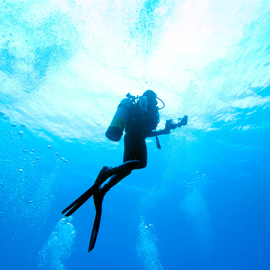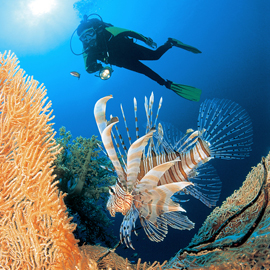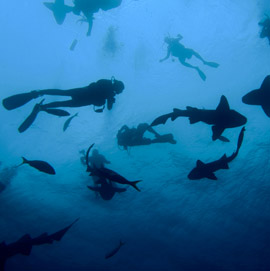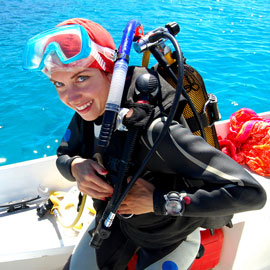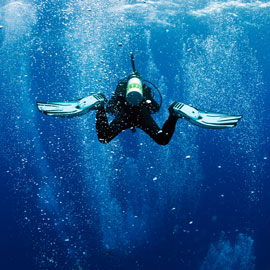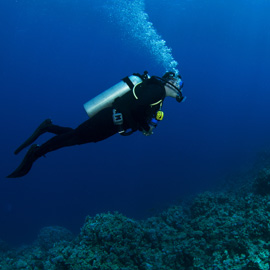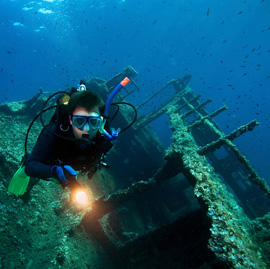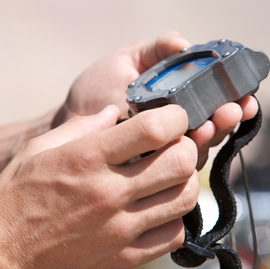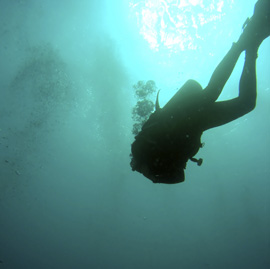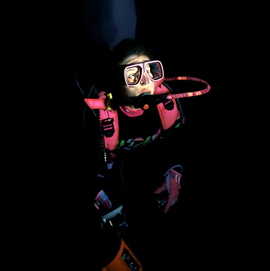Specialty Diving | Do Dive In
Navigating with the Underwater World
Though a compass or GPS can make navigation easy, you don’t have to rely on these tools to find your way around underwater. Like an ancient mariner guided by nothing more than the stars of the night sky, you can use details in the world around you as natural navigational references on any dive. After you get your scuba certification in Illinois, learning the best way to follow these natural landmarks can help you know where you are and how to get to where you’re going. [Read more]
What the Fish?
There are an estimated 21,000 species of fish in the world and getting a closer look at them is one of the major attractions of scuba diving certification. From Illinois reservoirs to Caribbean coral reefs, there are fish of countless colors, shapes and sizes awaiting you underwater. [Read more]
Swimming with the Sharks
Many divers seem to be just as attracted to shark encounters as they are apprehensive of them. Despite their dangerous reputation, sharks pose little risk to scuba divers—it’s often said that you’re more likely to be struck by lightning than attacked by a shark, and there are countless places worldwide to experience a safe and well-managed shark encounter. [Read more]
Get Ready for Boat Diving
Whether the dive boat you’re embarking on is a tiny dinghy, a 6 pack or a multi-diver behemoth, following a few simple rules will make things easier for you and the crew. While you can take advantage of our boat diver specialty class to learn all there is to know about diving from different kinds of boats, the tips below can help you be a perfectly polite and well-prepared boat diver on any excursion. [Read more]
Nitrox Diving: The Benefits and Precautions
After receiving your scuba certification in Illinois, you’ll have the opportunity to start expanding on your skills by learning more advanced scuba techniques. For many, this means taking specialty diver classes that help you master new skills, and no skill can help you get more out of every scuba experience than nitrox diving. [Read more]
Diving Deeper
If you’re hoping to explore some wrecks, come face to face with unique ocean life and make the most of your scuba skills, deep diving is the way to do it. Unfortunately, those added rewards come with added risks. Diving deeper than 60 feet increases your chances of depleting your air supply and experiencing nitrogen narcosis, but these dangers can be overcome with proper training and preparation. [Read more]
Check Yourself Before You Wreck Yourself
Sunken schooners, algae-covered school buses, train cars, fire trucks and telephone booths—manmade treasures like these can make for a ton of underwater fun. Wreck diving gives you the chance to take in some very unusual sights, and the prevalence of these underwater ruins makes them accessible just about anywhere: at the depths of the ocean, in the chill of Lake Michigan and even in some of the Midwest’s limestone quarries. [Read more]
Picking the Perfect Dive Computer
Also known as a decompression or deco meter, a dive computer can be a vital part of staying safe on any dive after you get your scuba certification in Illinois. By determining the length and depth of your dive, a dive computer can provide the parameters you’ll need to stay within to keep your nitrogen levels from becoming problematic. [Read more]
Go with the Flow: The Basics of Drift Diving
During a drift dive, you’ll take advantage of the ocean’s currents to experience what it truly feels like to fly underwater. By exploring ocean areas with known currents, you can minimize your effort and maximize your distance and time, taking in the scenery as you’re carried parallel to stunning reefs and aquatic wildlife. But just as with any dive, preparation and education are essential to keeping your scuba experience as safe and enjoyable as possible. [Read more]
Night Diving Primer
Night diving lets you see any underwater world in a whole new way. A sweep of your dive light through the nighttime sea may reveal all sorts of creatures that seek refuge during the daylight hours: basket stars, lobsters, sea turtles, bioluminescent plankton and more. Your flashlight’s beam can expose mysteries you never imagined, even making the colors of the reef more radiant and intense. [Read more]
